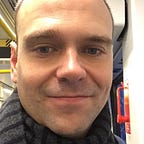Truths that have changed through my career
Group work to individual curiosity
I’m almost embarrassed by some of truths I held firm early on in my career. This is a sign of progress, never be afraid to say “At the time I thought I was right, but now I know more”. Consulting is expensive and you always need to ask yourself what if you’re contribution isn’t something that couldn’t be done by someone offshore at a fifth of the cost.
Early truth 1: Work starts with a group, a meeting and a whiteboard
I used to start designing software with client workshops. Day 1 was a blank whiteboard and a client group, fleshing out how things work.
This appeared to work. We had consensus, we had an outcome, a process had been mapped. But how efficient and effective was this? Not at all. In a room of 10 people, 7 were on their laptops, 1 was dominating the conversation, and the other 2 were too afraid to voice their opinion.
And… Did I need to spend 44 hours to get a draft process map of the order process for a printer? (there were 10 people, plus me, for 4 hours). High cost, highly inefficient, low output and outcome.
New truth: Build something first, be a private investigator
What if I just took a guess first?
What the order process would be? What if I googled, what if I phoned my friend who worked at a printer store? What if I asked my colleagues? Then mapped it, had a 1on1 interview with a key client stakeholder, asked 100 questions, and jointly created the new version. Then I did a quick paper prototype, recorded a video of me walking through it and shared with a broader group. Then only gather a group, but use design thinking methods to facilitate a small group. Break the room up into 3 groups of 3, have them redesign the prototype, create the feature list, prioritise and critique.
It’s impossible for your users to visualise what they are working with until they see it. Start with a prototype, then drive design. Your prototype can be on a piece of paper, and be terrible. That’s far better than a blank whiteboard.
You can do this by yourself. Have a point of view. Do a draft version, a bad version, take a guess, then refine. Meetings with more than 3 people where most are observing and few are talking are a waste of time.
So in summary:
- From group work to individual curiosity
- From workshops to small interviews
- From people to data gathering
- From facilitator to private investigator
- From whiteboards to prototypes
The skill of group facilitation is important, but the industry has made a mistake in glorifying this over individual ownership and small, highly targeted detective type work.
When people adopt these habits they are labelled a ‘gun for hire’ and the work is richer, rewarding and detailed.
